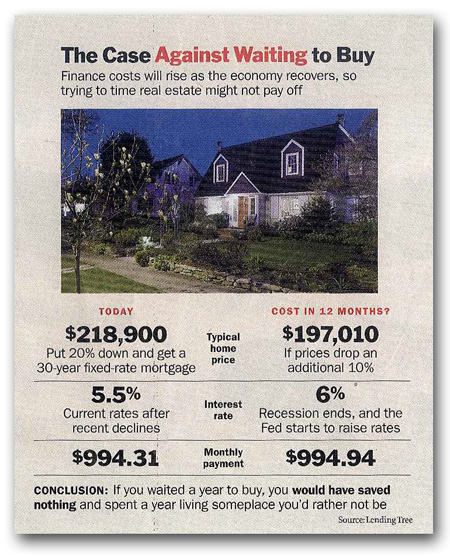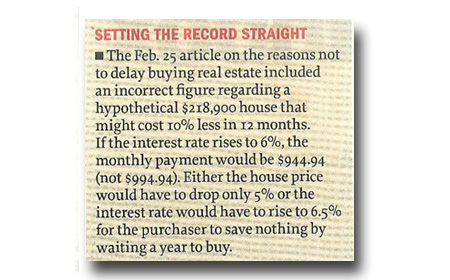
Sometimes I shake my head at some of the incredibly STUPID financial advice I see given out by so-called financial experts. Just when you think you’ve seen it all: TIME Magazine recently hit a new nadir in financial advice (2/25/08, p. 54. Full article below).
Proposition: If interest rates rise .5% (i.e. 50 basis points, 1/2 percent) you are better to buy a house now than wait a year for prices to drop 10%.
Rationale: The payment on a 80% loan-to-value (LTV) mortgage at 5.5% percent (30 yr. amortization, 20% down) for a $218,900 house is the same as for a $197,010 (10% less) at 6% interest. Both are about $994 (see Time graphic below).

CONCLUSION: “If you waited a year to buy, you would have saved nothing…” (Boldface by TIME).
EXCUSE ME??? (boldface by me). Saved nothing by waiting a year and buying 10% lower? You would have saved almost $22,000 dollars!!
This is the “to heck with cost, just tell me the payment” mentality taken to the extreme. I don’t care what it costs as long as I can afford the payment? Capital and cash flow are two very different things and a wise person understands both.
Yes, if you keep the house a full 30 years, things would probably work out financially equivalent at the end. However, lots of things can happen in thirty years, and any sale or refinance would leave any taker of this advice with a lot more debt.
Given that the average American moves every 7 or 8 years and seemingly refinances even more often, the odds are that anyone taking this advice would end up very much on the financial short end of the stick with a whopping extra $20,000 or so to either refinance or convince a subsequent buyer to pay.
And that is not the best part of the story. There is more. You won’t believe this. That graphic up there? The one TIME magazine printed? In a national publication? It’s WRONG!
Here’s the correction on the website: “Due to an inputting error in information supplied by Lending Tree, the original version of this article contained incorrect data in an example assessing the relative cost savings of buying a home today or waiting a year for the housing market to drop 10%.”
What they don’t say (you have to deduce it from comparing the print graphic v. the online) is that the numbers shown in the case of waiting a year are based on a 6.5% interest rate (a full 1% increase), not the 6% (or .5% increase) originally shown.
It’s also not very impressive or confidence building that they tried to blame a third party for the error. How about “Due to our failure to check the math?”
The printed correction in a subsequent issue is directly below. Unfortunately it repeats the erroneous assertion “purchaser would save nothing by waiting a year to buy.”

______________________
Ignore the Headlines
Finance costs will rise as the economy recovers, so trying to time real estate might not pay off
Thursday, Feb. 14, 2008
By DAN KADLEC
Famed Money Manager, Peter Lynch, is perhaps best known for his timeless wisdom that you can beat the pros by focusing on stocks of companies where you either work or shop or have some other edge. But a more relevant Lynchism today is this gem: Ignore the headlines.
That’s no easy thing. How do you tune out all the chatter and ink on recession, housing, subprime woes, the credit crunch, rogue traders, insolvent bond insurers, $100 oil and nukes in Iran? It’s enough to make you sit on your thumbs and wait before making any big moves. But what, exactly, are you waiting for?
There has rarely been a moment in history when you couldn’t scare yourself into doing nothing. And yet, as Lynch observed nearly 20 years ago, “in spite of all the great and minor calamities that have occurred … all the thousands of reasons that the world might be coming to an end–owning stocks has continued to be twice as rewarding as owning bonds.”
A top reason to not buy stocks, in Lynch’s view, is if you don’t already own a home––in which case, that should be your first investment, since an owner-occupied home is nearly always profitable. Through a spokesman, Lynch reaffirmed these views to me––housing debacle and all.
When prices are falling, few people have the discipline to buy stocks, a house, gold, art or any other asset. But those who do pull the trigger excel in the long run. As John D. Rockefeller famously said, “The way to make money is to buy when blood is running in the streets.”
And the streets are stained crimson. Start with stocks. They have been pummeled this year. GDP braked sharply last quarter, and there has been plenty of panic about a recession. The Federal Reserve is slashing short-term interest rates at the fastest clip in decades. But if you stick to your steady, diversified plan while everyone else is retreating, you will be happy years from now. For one thing, Fed rate cuts always lift the economy eventually, and the stock market typically starts responding just as headlines get gloomiest. Sure, the market could fall again before recovering. But the recession may be half over already––or we may avoid one altogether. You just never know.
As for housing, certainly some skepticism is in order. Formerly sizzling markets in Florida, Nevada, Arizona and California probably haven’t seen the worst headlines just yet, though they may well be close. And “jumbo” mortgages, those more than $417,000, are likely to remain artificially high for a few more months while banks work through their credit issues.
But let’s say you are emotionally ready to be a homeowner. You have good credit, plan to stay put for five years and have been waiting for the perfect entry point. It’s time to get serious––before an inevitable rise in interest rates wipes out your advantage. “The thing that will make home prices stop falling is the very same thing that will push mortgage rates higher,” says Jim Svinth, chief economist at mortgage firm Lending Tree. So anything you gain by a further drop in prices might be offset by rising financing costs.
Consider a typical home that sells for $218,900. You put down 20% and get a 30-year fixed-rate mortgage at today’s rate of 5.5%. Monthly principal and interest come to $994.31. Let’s say that 12 months from now the same house goes for 10% less, or $197,010. But by then the recession is history and the Fed is jacking up rates to stem inflation. If mortgage costs rise a point, to 6.5%, your monthly payment would be $994.94 and you’d have saved nothing. Meanwhile, home prices might steady and sellers might become less willing to negotiate. And you have spent a year living someplace you’d rather not be.
It’s more complicated if you must sell before you can buy. But that logjam won’t persist forever––and if it appears you’ll be trapped for a few years, try to refinance at today’s lower rates. Risks always seem most acute when the headlines give you ulcers. But that’s exactly when you should think long term–and get off your thumbs.
(On-line correction appended: February 19, 2008)
[This article contains a table. Please see hardcopy of magazine.]
Due to an inputting error in information supplied by Lending Tree, the original version of this article contained incorrect data in an example assessing the relative cost savings of buying a home today or waiting a year for the housing market to drop 10%.


0 Comments